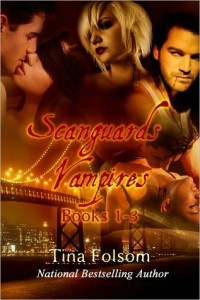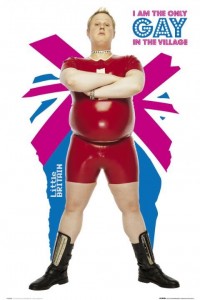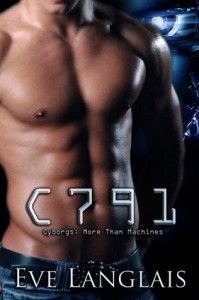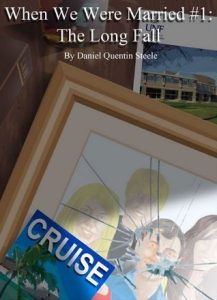 I grabbed Tina Folsom‘s first Scanguard Vampire book, Samson’s Lovely Mortal, off the Amazon Free list. Then, curious about Amaury, I bought the compilation containing the first three books for $0.99. Come on, that’s $0.33 a book, even if I did end up with two copies of the first book. That’s pretty hard to beat.
I grabbed Tina Folsom‘s first Scanguard Vampire book, Samson’s Lovely Mortal, off the Amazon Free list. Then, curious about Amaury, I bought the compilation containing the first three books for $0.99. Come on, that’s $0.33 a book, even if I did end up with two copies of the first book. That’s pretty hard to beat.
Descriptions from Goodreads:
Samson’s Lovely Mortal
Vampire bachelor Samson can’t get it up anymore. Not even his shrink can help him. That changes when the lovely mortal auditor Delilah tumbles into his arms after a seemingly random attack. Suddenly there’s nothing wrong with his hydraulics – that is, as long as Delilah is the woman in his arms.
Amaury’s Hellion
Vampire Amaury LeSang is cursed to feel everybody’s emotions like a permanent migraine. The only way to alleviate the pain is through intercourse. When he meets the feisty human woman Nina, a cure for his ailment seems within reach: in her presence, all pain vanishes. Unfortunately, Nina is out to kill him …
Gabriel’s Mate
After Maya is turned into a vampire against her will, vampire and Scanguards bodyguard Gabriel is charged with protecting her and finding her attacker.
Gabriel has never guarded a body as perfect as Maya’s. Even as the sexual tension between them rises and the rogue vampire closes in, Gabriel refuses to give into his desire. Despite the intimacies they share, Gabriel fears that if he ever reveals himself fully to her, Maya will react like other women have, running from him, calling him a monster …
Review: Samson’s Lovely Mortal
Ok, for the most part, I thought this was a lot of fun. The first chapter is LMFAO funny. Really, imagine a big bad PNR vampire lead trying to explain to his shrink he doesn’t have an anger problem he has ED. Too funny! The rest of the book doesn’t rise to quite the same level of humour, but it would be hard to establish much of a plot if it did. Despite that, it still had a ton of funny one-liners in it. The humour is the best part of the book, by far.
The sex is smoking’ hot and there is a lot of it. The whole middle of the book is essentially one protracted sex scene. This sometimes obscures a good story, but amazingly there is a plot in there too, so no real complaints.
I generally enjoyed this book. The writing was fairly simplistic, but solid and perfectly functional. The four friends had a good rapport and Samson and Delilah (oh, yeah, that’s really their names) have a great repartee. Delilah is a full-grown, sexually aware woman who knows what she wants and isn’t afraid to go after it. There is no wimpy pseudo-virgin here. Delilah is truly a strong female lead and I love that about her. And Samson breaks the PNR vampire mold, in that he is an emotional basket case. I loved it.
I only have two real complaints. But for me they are major ones. In a sense I almost imagine this book as the literary Valley-Girl equivalent of the stock phrase, “it’s sooo AMAZING.” You can almost hear that nasally, high-pitched airhead voice calling it out to her equally vacuous latte-lugging, silicone encrusted BFF. Because every single experience, thought, emotion, touch, feeling, orgasm, sight, smell, etc is described as being more meaningful, moving, important, etc than any one previously had by the characters. I lost track of how many times one or the other of them “had never felt so…,” “it was the first time….,” “it was more than…,” “he/she had never before…,” etc. Every little thing! I got the message loud and clear, but after a while, it started to feel like a cheap trick rather than a legitimate description.
Secondly, and I know I’m probably out there on my own with this one, but everything turned out too well. Delilah’s sudden effusive love almost gave me whiplash. The bad guys were apprehended and bested with ease and everyone left was forgiven. Then there was the whole closure with Delilah’s father and Peter. It was way too much. This sort of thing doesn’t pleasantly pluck my heartstrings, it makes me gag. It’s too saccharine sweet. Obviously, this is a personal preference kind of complaint, but it was enough that I almost didn’t buy the sequel. I probably wouldn’t have if it hadn’t been so cheap.
Despite those two major personal irritants, the book was a fun read. I liked the characters and the humour and that was enough to carry the story for me.
Review: Amaury’s Hellion
While this story lacked the humour of book one, it was still a fun little read. (And saying it wasn’t as funny as Samson’s Lovely Mortal doesn’t mean there were no funny bit. There were, just not as many.)
Like the first book, this one had a wonderfully strong, sexually aware female lead. In fact, my absolute favourite part of this book was Folsom’s willingness to hand some of the power normally held exclusive to PNR male leads to Nina. She tied Amaury up, made sexual demands, tormented him with sex, etc. All acts that the more powerful of a couple usually perpetrate on the weaker. I REALLY enjoyed seeing the roles reversed. And, for the record, Amaury never came across as weak as a result of Nina’s strength. It was worth reading just for that.
I do have to go on a little personal rant here, in case others feel the same way. [Some find this a mild spoiler, BTW.] The easy use of rape as a plot device, which has become far too offhand and common in women’s literature as a whole (so this isn’t a criticism levelled against Ms. Folsom’s writing alone), felt tawdry at best. Especially when paired with abuse at the hands of multiple foster fathers. After more than a few years working in Children’s Social Services I can say from experience that there are far more wonderful guardians than not. But this book makes foster father feel synonymous with sexual predator…cheap and overused in general. It’s the best I can say for it.
Now, the book also played the ‘it’s so new and amazing’ card pretty heavily, but it wasn’t as gag-inducing as in book one. I did find the ending predictable, but despite there being a lot of sex (what do you expect, really?) there was a plot. It was followable and it did stand on it’s own. So, on to book three.
Review: Gabriel’s Mate
While I liked Gabriel and didn’t dislike Maya, I can’t say this book stood up to the first two, for me. The writing and editing was fine. That wasn’t the problem, but the content was über cheesy. This is, of course, a subjective observation. But it surpassed my acceptable cheese level without employing enough levity to make it humorous. I can’t really address why without spoilers, but it would be obvious on reading the book, for likeminded people. (Not everyone of course)
I also find ch
Now, I know I sound negative, but again, I didn’t wholly dislike the book. There was nowhere near as much sex in this book as the previous ones (though the sex is part of what I found so cheesy), which left more room for plot development. And the basic, ‘it couldn’t be’ left the reader wondering red herring or real long enough to avoid painful obviousness. There is one major “oh, no!” moment and the reader is allowed the opportunity to get to know some of the side characters better. So there was plenty to appreciate here. [SPOILER]**** Though I really hate seeing pre-established characters go bad without explanation!
Now, a word on Thomas: I absolutely appreciate that Folsom has decided to branch out from the heterosexual PNR norm and include a homosexual character. I applaud her. However, to say he is overplayed is an understatement. He wears his black leather like a uniform and is constantly referred to as ‘the gay friend,’ who goes to ‘gay bars’ and claims his ‘gay man’s perogative,’ etc (and yes, that’s the way all it’s said, no variation). It’s even thrown in in situations in which his sexuality should be irrelevant.

Eventually I kind of started imagining him as Daffyd Thomas (could that name be accidental?) from Little Britain. You know, the one who constantly squeaks, “but I’m the only gay in the village,” when he’s clearly not. I noticed this in the previous books too, but more so here since he played a bigger role and there started to be hints of a future M/M arc. I liked him. Don’t get me wrong. It just seems like there wasn’t any reason to make it quite so explicit, quite so often. It left no way for it to feel natural.
All in all, my final say is “meh.” it’s written well enough, so I’m not calling it a bad book, but there were enough aspects of it that I disliked or was simply annoyed by to keep me from claiming to have liked it.
 I grabbed Eve Langlais‘ C791 (More Than Machines, #1) from the Amazon free list. At the time of posting, it was still free.
I grabbed Eve Langlais‘ C791 (More Than Machines, #1) from the Amazon free list. At the time of posting, it was still free.


 Partial Description from Goodreads:
Partial Description from Goodreads: